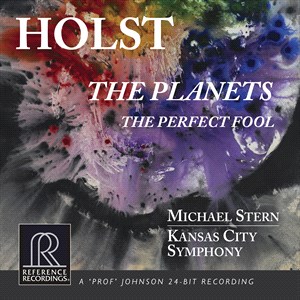
ESSENTIAL RECORDINGS

What do you think would deliver the best results. Observing the solar system through a telescope or using a microscope?
It's a well known fact that Reference Recordings have always been on the leading edge when it comes to audio engineering, and have always released clear, detailed and high-end classical music recordings. But too much clarity, detail or focus can have adverse or even deleterious effects. With that said, this is a very solid interpretation of The Planets by Gustav Holst, a wonderful orchestral tour de force of the 20th century, with commited playing from the members of the Kansas City Symphony Orchestra. But, I don't know about you, but my favorite recordings of The Planets have a spatial depth and atmospheric character to them that is missing in this new recording. When the solar system happens to be the subject matter, "spatial" and "atmospheric" should be highly appropriate. Let's take for example one of my favorite moments in the whole suite. The final minutes of Saturn, the Bringer of Old Age which represent the soul ascending to heaven after death. Well in the most "spatial" and three-dimensional recordings, it also evokes the image of a massive celestial body floating effortlessly against the enigmatic darkness of deep space, a wonderful effect that's missing when each and every tinkle of a triangle, pluck of a string or note on a flute are all closely focused. You should not be able to discern exactly from where in the orchestra or from which instrument a particular note was played. As a matter of fact, in the superlative recordings, the instruments need to vanish within the music and recede from aural perception.
Since I have never been disappointed in the past by a Reference recording, maybe, because The Planets is such an orchestral showpiece, my expectations were too high in this case. But it's precisely because it's an "orchestral" jewel that the depth and scope of a full orchestra needs to be captured. I'm well aware that Holst was trying to convey each planet's astrological character rather than it's mass, but the scope of each planet is also well projected within the brilliant orchestration. I'm not an audio engineer, but I fear that too many microphones spotlighting certain instruments is the culprit in this case. But if that's the type of recording technique you enjoy, this version of The Planets is for you.
Jean-Yves Duperron - October 2019